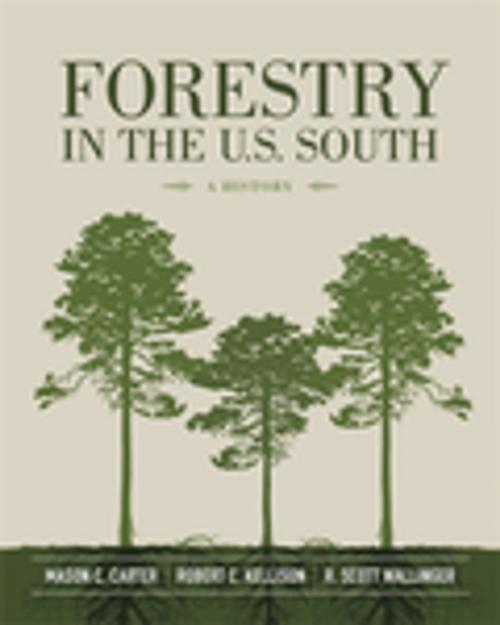Forestry in the U.S. South
A History
Nonfiction, Science & Nature, Science, Biological Sciences, Environmental Science, History, Americas, United States| Author: | Mason C. Carter, Robert C. Kellison, R. Scott Wallinger | ISBN: | 9780807160565 |
| Publisher: | LSU Press | Publication: | November 9, 2015 |
| Imprint: | LSU Press | Language: | English |
| Author: | Mason C. Carter, Robert C. Kellison, R. Scott Wallinger |
| ISBN: | 9780807160565 |
| Publisher: | LSU Press |
| Publication: | November 9, 2015 |
| Imprint: | LSU Press |
| Language: | English |
During the second half of the twentieth century, the forest industry removed more than 300 billion cubic feet of timber from southern forests. Yet at the same time, partnerships between public and private entities improved the inventory, health, and productivity of this vast and resilient resource. A comprehensive and multilayered history, Forestry in the U.S. South explores the remarkable commercial and environmental gains made possible through the collaboration of industry, universities, and other agencies.
This authoritative assessment starts by discussing the motives and practices of early lumber companies, which, having exhausted the forests of the Northeast by the turn of the twentieth century, aggressively began to harvest the virgin pine of the South, with production peaking by 1909. The rapidly declining supply of old-growth southern pine triggered a threat of timber famine and inspired efforts to regulate the industry. By mid-century, however, industrial forestry had its own profit incentive to replenish harvested timber. This set the stage for a unique alliance between public and private sectors, which conducted cooperative research on tree improvement, fertilization, seedling production, and other practices germane to sustainable forest management.
By the close of the 1990s, concerns about an inadequate timber supply gave way to questions about how to utilize millions of acres of pine plantations approaching maturity. No longer concerned with the future supply of raw material and facing mounting global competition the U.S. pulp and paper industry consolidated, restructured, and sold nearly
20 million acres of forests to Timber Investment Management Organizations (TIMOs) and Real Estate Investment Trusts (REITs), resulting in an entirely new dynamic for private forestry in the South.
Incomparable in scope, Forestry in the U.S. South spotlights the people and organizations responsible for empowering individual forest owners across the region, tripling the production of pine stands and bolstering the livelihoods of thousands of men and women across the South.
During the second half of the twentieth century, the forest industry removed more than 300 billion cubic feet of timber from southern forests. Yet at the same time, partnerships between public and private entities improved the inventory, health, and productivity of this vast and resilient resource. A comprehensive and multilayered history, Forestry in the U.S. South explores the remarkable commercial and environmental gains made possible through the collaboration of industry, universities, and other agencies.
This authoritative assessment starts by discussing the motives and practices of early lumber companies, which, having exhausted the forests of the Northeast by the turn of the twentieth century, aggressively began to harvest the virgin pine of the South, with production peaking by 1909. The rapidly declining supply of old-growth southern pine triggered a threat of timber famine and inspired efforts to regulate the industry. By mid-century, however, industrial forestry had its own profit incentive to replenish harvested timber. This set the stage for a unique alliance between public and private sectors, which conducted cooperative research on tree improvement, fertilization, seedling production, and other practices germane to sustainable forest management.
By the close of the 1990s, concerns about an inadequate timber supply gave way to questions about how to utilize millions of acres of pine plantations approaching maturity. No longer concerned with the future supply of raw material and facing mounting global competition the U.S. pulp and paper industry consolidated, restructured, and sold nearly
20 million acres of forests to Timber Investment Management Organizations (TIMOs) and Real Estate Investment Trusts (REITs), resulting in an entirely new dynamic for private forestry in the South.
Incomparable in scope, Forestry in the U.S. South spotlights the people and organizations responsible for empowering individual forest owners across the region, tripling the production of pine stands and bolstering the livelihoods of thousands of men and women across the South.















